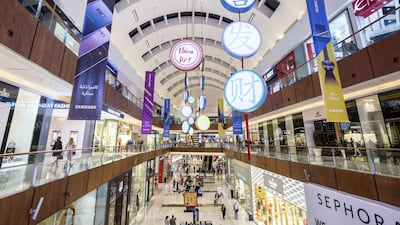Despite macro-economic headwinds and a slowing global economy, the GCC's retail sector is forecast to grow by about 22 per cent to $308 billion in 2023 from last year with the UAE and Saudi Arabia accounting for the bulk of sales over the next five years.
The size of the Arabian Gulf retail sector market is expected to see 4 per cent compound annual growth rate until 2023, rising from $253.2bn recorded in 2018, Dubai-headquartered investment advisory firm Alpen Capital said in its latest GCC Retail Industry report. Saudi Arabia and the UAE, the two largest economies in the Arab world, account for about 77 per cent of sales in the next five years.
Population growth, a rise in per capita gross domestic product, and an expanding tourism industry will help drive the retail sector's acceleration and boost economic diversification efforts of traditionally hydrocarbon-dependent GCC countries, according to the report.
“Demographics are favourable for the growth of retail sector [with the population] rising faster than some of the other parts of the world,” Krishna Dhanak, executive director at Alpen Capital, said in Dubai on Monday.
The retail sector across the Arabian Gulf states, has been under pressure in the past few quarters due to a slowdown in the global economy, lower oil prices and muted demand. However, developers have continued to build mixed-use projects with retail components, adding more capacity to the market.
Oil prices, which fell below $30 per barrel in the first quarter of 2016 have since recovered to hover around $70 per barrel and the economic momentum has gathered pace in the UAE. A boost in tourism numbers has also set the foundations for the retail sector's growth and the economic recovery is expected to buoy consumer confidence.
The UAE’s economy is expected to strengthen this year, boosted by higher levels of government spending and increased oil production, propelling the country to outperform the wider region in 2019. The country’s GDP is expected to expand by 2.2 per cent from an estimated 1.7 per cent in 2018 – driven by 2.5 per cent growth in real oil GDP, and 2.1 per cent non-oil GDP growth, according to the latest report from Oxford Economics and the ICAEW.
Dubai's economy, the commercial and trade hub of the Middle East, is projected to expand at a faster pace this year than 2018, as the emirate continues to implement policy initiatives and investment measures under its 50-year development charter. The emirate's GDP is expected to grow 2.1 per cent in 2019, further accelerating to 3.8 per cent and in 2020, and moderating slightly to 2.8 per cent in the following year, after growing 1.9 per cent last year, according to Dubai Economic Department figures.
While the bellwether property sector is still facing headwinds, the emirate is banking on contributions from its finance, retail and tourism sectors for non-oil economic growth this year and next.
Within the GCC, the UAE is expected to lead the pack in terms of retail sector growth on the back of government initiatives such as Dh50bn three-year economic stimulus package, easing of visa restrictions and renewed spending on infrastructure projects. During the forecast period, annualised growth in retail sales across the GCC is expected to range between 2.2 per cent to 5.1 per cent.
The UAE is ranked fifth among the top-ten retail destinations in the world, and the country has seen its retail market grow CAGR of 3.8 per cent to $73bn between 2012 to 2016. Tourist spending is among the highest in Dubai, with overnight visitor spending reaching $29.7bn in 2017 alone, according to the report.
Despite the positive outlook, an oversupply of commercial space and higher rents, coupled with challenges posed by the rise of e-commerce in the region remain major challenges for the retail sector's growth, Alpen Capital said.
About 5.2 million square metres of retail space is likely to come to the GCC market in the next five years, taking the total organised retail gross leasable area to 20.4 million square metre, “which may create an oversupply situation”, Mr Dhanak said.
The rising number of international brands operating in the region has also intensified competition and higher operating costs have eroded margins for retailers who are adopting aggressive promotional campaigns, he added.


